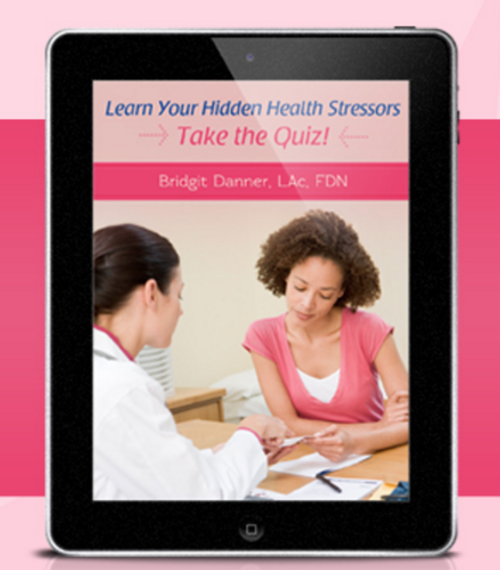Do you think parasites have nothing to do with hormones? Or that parasites are very rare and only found in places like rural Africa?
You would be wrong on both counts. In this article, I'll explain:
What is the connection between hormones and parasites
What are the symptoms of a parasitic infection
Why are parasites so common
What you can do about it
The Link Between Parasites and Hormones
A parasite is dictionary defined as “an organism that lives in or on another organism (its host) and benefits by deriving nutrients at the host's expense.”
You might be thinking, “well shouldn't my body prevent parasites?” You are right; it should but it doesn't always succeed. Parasites can enter through the skin or the vagina but the most common area of entry is the mouth.
When you eat something or put your hands in your mouth you expose yourself to potential parasites and their larvae. Parasites are found in soil and feces and do a great job of spreading themselves around.
When you swallow a parasite, your stomach acid should burn off the pathogen. However many of us have low stomach acid production from a thyroid condition, because of aging, or because we were eating on in a rush and we didn't get our bodies into “rest and digest” mode.
If a parasite survives the stomach it can live in the intestines or move to other areas of the body. Parasites can remain for decades. You may also be wondering, “isn't it somewhat normal to have parasites?”
According to Dr. Ann Louise Gittleman in her book Guess What Came to Dinner?, some amount of parasites could make for no noticeable symptoms. It really depends on the type and quantity of parasites and the strength or weakness of the host.
You are the host and the environment you create in your body helps determine if a parasite finds a good home or not. If your intestines are out of balance because of eating inflammatory foods, leaky gut, antibiotic use, other infections, or eating a high-sugar, high-refined flour diet you are providing a welcoming home for a parasite.
So now you understand how having a parasite is indeed possible. But why would this affect your hormones?
Having a parasite will cause inflammation in the gut and a potential loss of nutrients going to you, the host.
Hormones stay in balance through:
Production
Clearance
Communication
Parasites will contribute to the overall poor environment in the gut. And your gut is an important location for hormone production and clearance.
The nutrients you absorb in the gut are the ingredients to make hormones: B vitamins, amino acids, fats, etc. That's why I consider it not only very important to eat nourishing foods, but also to take high-quality supplements to 'mind your gut'.
Parasites can contribute to an imbalanced bacterial environment in your gut. (Other contributors are sugar, alcohol, white flour, genetically-modified foods, and antibiotics.) That imbalance can lead to a re-activation of used estrogens getting back into circulation in your body, possibly increasing your risk of breast cancer. (source)
In a healthy gut, used hormones that have been rendered inactive in the liver will be expelled in the intestines through the bile. In an unhealthy gut, an enzyme called beta-glucuronidase will be produced, making estrogen active again. This happens within a set of gut bacteria called the estrobolome.
Dr. Izabella Wentz, in her book Hashimoto's Protocol: A 90-Day Plan for Reversing Thyroid Symptoms and Getting Your Life Back, connects many parasites to the "triggering and exacerbating" of the autoimmune thyroid condition Hashimoto's Thyroiditis. These include: Giardia lamblia, Dientamoeba fragilis, Toxoplasma gondii, Entamoeba histolytica, Blastocystis hominis, Bartonella henselae and Cyrptosporidium.
Hormones are made in response to the needs of your body. If your body is chronically fighting an infection in your gut and dealing with the inflammation there, hormones will be made to combat that stress, namely stress hormones like adrenaline and cortisol.
As a woman, you want a balance of stress hormones and more restorative hormones in the Dehydroepiandrosterone (DHEA) family like estrogen and testosterone. If your body is making a lot of cortisol in comparison to DHEA, you could have symptoms like overwhelm, low sex drive, infertility and loss of muscle mass. Menopause and peri-menopause can be more difficult.
The above are just a few ways that parasites and an unhealthy gut can lead to hormonal problems.
Symptoms
The symptoms of a parasitic infection are numerous. This list is by no means a way of diagnosis but rather examples of the diverse ways that a parasite could manifest:
Constipation
Diarrhea
Gas and bloating
Muscle pain
Anemia
Autoimmune diseases
Skin rashes
Insomnia / Waking up too early
Anxiety
Fatigue
Teeth grinding
Frequent colds and flu
In this article, I am focusing on parasites but we often see parasites in our clients like Small Intestine Bacterial Overgrowth (SIBO) and candida. Parasites can also help house and protect things like Epstein-Barr virus, mold mycotoxins, and Lyme infection. So in complex cases is often important to clear the gut of these pathogens.
But sometimes our clients are fairly healthy have lots of good habits, they are just stuck in one area of their health. They can't get pregnant or they're chronically bloated. These are cases where we've been able to address the gut and get good results overall.
According to the Center for Disease Control, millions of people in the United States are affected by parasites every year. How much of a problem parasites depend on who you ask. The colleagues of mine who treat complex cases are quite convinced of the efficacy of parasite treatment. You can hear my interview with parasite expert, Dr. Todd Watts here, and you can register for the Parasite Summit here (and more information is below).
Parasitic infections do seem to be on the rise because of these factors:
International travel
Contaminated public water supply
Household pets
Daycare centers
Eating at restaurants
Food imported from other countries
The use of antibiotics
Factory farming (including farmed fish)
A Personal Story
When I was in my early twenties I lived in a village in South America. All the pathogens there were new to my body and even though I tried to drink clean water I got very sick a few times. After that, I lived in Mexico and while there I was chronically constipated. I didn't know much about parasites back then but I suspected them I looked into getting a test run but opted for a kit I could buy at the store to clean parasites in my colon. Later my boyfriend at the time, who also lived in South America, passed a long worm out of his stool.
I forgot about parasites for a while but during a stressful time in Chinese medicine school, I developed IBS that would not go away. I attributed it to stress. If my diet is “really perfect” with all fresh, clean foods my digestion can be pretty stable. But cheating at all on corn chips or a beer would make me have loose stool again. This pattern went on for many years and I even had to stool test and treated H pylori infection with still no improvement.
One of my parasites that came out in my stool.Trust me, I was really grossed out when I first saw this too. Toothbrush somehow makes this picture grosser. I did not touch it to my toothbrush, just put it on top of bag for size comparison.
This past summer I interviewed Dr. Todd Watts office about parasites. Perhaps with that awareness in the back of my mind, I noticed a parasite in my stool the next day. I quickly ordered a stool test from a leading company we use and the test came back positive for a type of parasite.
I have been treating my parasite and, though I'm just beginning, I have passed another worm and some larvae which, while gross, is also pretty exciting to know that I am getting something out of my body that was likely stressing it for a long time. I know that my white blood cell count has been low for years and no one was able to explain it but I think this helps explain it.
Besides coming back from South America with a probable parasite I also came back with a lackadaisical attitude about sanitation. I thought that here in the US we were too paranoid about cleanliness. We have also learned in the last decade a lot about the microbiome and we are often encouraged to 'eat dirt and go barefoot.’
After reading Guess What Came to Dinner? by Dr. Ann Louise Gittleman, I have quite a different perspective. We DO want to be clean and careful to prevent parasites. It is much easier to prevent parasites then test and treat for them later.
Prevention Tips
Luckily there is a lot we can do to prevent parasites:
Always wash hands prior to eating
Keep your fingernails short and scrub under them with a brush
When you use a public toilet seat squat over it rather than sitting on it
At home, keep your bathrooms clean and sanitize toilet seats and bowls*
Keep the interior or your car clean*
Avoid kissing your pets or letting your children do so
All family members should wash their hands after petting the family pet
Pick up pet waste and don't let your kids play in areas where they can be exposing themselves to residual pet waste
Get a report on your local water quality and drink only filtered water (Filters need to be very fine a size of 3 microns or under to filter microorganism cysts.)
While hiking, never drink out of streams and carry a fine pore filter of 3 microns or under while camping
Wash raw fruits and vegetables before eating
Be very careful with cooking meats and fish to ensure that any larvae in them are killed
Cook beef to an internal temperature of 160° f
Cook chicken, lamb and pork to 170° f
Cook fish until flaky and do not cook in a microwave
Avoid eating raw Pacific salmon and rockfish (Flash frozen fish are safer.)
Eat fiber such as raw nuts, beans, greens berries; these sweep your colon
Avoiding sugars and simple starches that parasites thrive on
Avoid swimming in freshwater lakes
Always sit on a towel in a sauna
Be aware that public mud baths and spas can carry the parasite Trichomonas vaginalis (This happened to me the only time I used a mud bath!)
If you are pregnant or immunocompromised, avoid changing your cat's litter box and have someone else and household do it
* Please note that you don't need to use potent chemicals for cleaning. You can use potent essential oils instead! Dr. Mariza Snyder is my to-go resource on essential oils, and her book, Smart Mom's Guide to Essential Oils: Natural Solutions for a Healthy Family, Toxin-Free Home and Happier You has many great cleaning recipes.
If you would like to learn more about parasites, I encourage you to attend the Parasite Summit hosted by Dr. Jay Davidson. This event is an eye-opening journey into parasites and their effects on health, hormones, detox and more!
Accurate testing for parasites cannot be conducted at your local doctor's office. The technology is just available in this setting and paradigm. We do conduct these tests with our private clients and develop protocols to help them eradicate gut pathogens. If you are interested in talking to us more about it you can check out our coaching options here.
To Your Health!
Bridgit
Bridgit Danner, LAc, FDNP, is trained in functional health coaching and has worked with thousands of women over her career since 2004. She is the founder of Women’s Wellness Collaborative llc and HormoneDetoxShop.com.












































